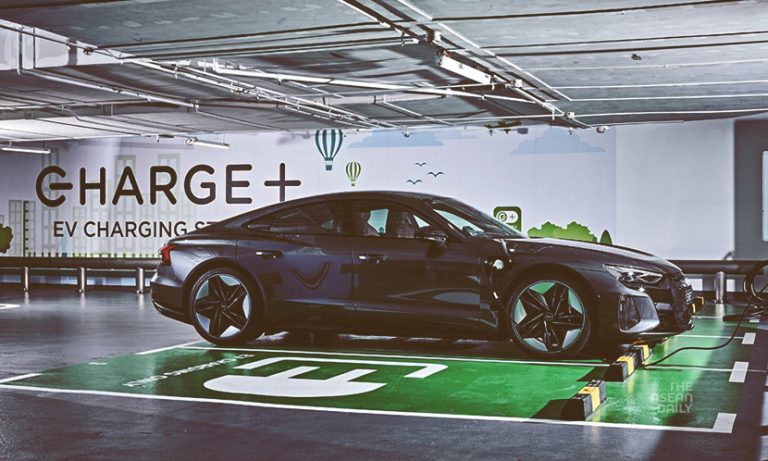14-11-2023 (SINGAPORE) In a groundbreaking move, Singapore has witnessed the installation of electric vehicle (EV) charging points at a surface-level Housing Board carpark for the first time. This initiative is part of an extensive project aimed at deploying EV chargers in public carparks across the city-state.
The newly operational six chargers at the open-air carpark at Block 209 Jurong East Street 21 mark the latest phase of the project, following a tender awarded in November 2022. By the close of 2023, a total of 30 surface-level Housing Board carparks in Ang Mo Kio, Bedok, Bukit Batok, and Bukit Merah are set to feature EV chargers under this scheme.
EV-Electric (EVe) Charging, a subsidiary of the Land Transport Authority (LTA) overseeing the deployment, disclosed that, as of October 31, approximately 1,600 chargers at 500 public carparks have been commissioned. An additional 860 chargers at 240 carparks are in various stages of development.
Under the contract awarded in November 2022, five charging service operators, overseen by EVe, will collectively install at least 12,000 charging points across nearly 2,000 Housing Board carparks by 2025.
The LTA aims to have EV chargers at over 700 Housing Board carparks, constituting about a third of the 2,000 public carparks, by the end of 2023. The first two multi-storey carparks to introduce EV chargers under this initiative were in Telok Blangah and Boon Lay in February.
Operated by Charge+, the chargers at the Jurong East Street 21 carpark are strategically located in a row, providing convenience for EV users. Notably, nearby motorcycle parking spaces, within reach of charging cables, extend the utility of the service to electric motorcycles.
Charge+ Chief Executive Goh Chee Kiong emphasized the confidence and peace of mind that the presence of EV chargers brings to Housing Board residents, potentially encouraging a shift towards electric vehicles.
Addressing concerns about outdoor charging, engineer and automotive writer Shreejit Changaroth explained that the charging connectors are designed to be weather-sealed, ensuring safety during rain. The EV charging system can also isolate the charging station from the vehicle in case of adverse conditions.
EVe Chief Executive Derek Tan acknowledged that deploying EV chargers at surface-level carparks can take longer, ranging from two to three months more than at multi-storey carparks. Factors such as weather conditions and additional requirements like trenching, cabling, and road resurfacing contribute to the extended timeline.
To implement EV chargers, operators must obtain approvals from the Housing Board, apply for power from utilities company SP Group, and secure clearances from various authorities, including LTA, town councils, and national water agency PUB.
In a separate development, EVe awarded a three-year contract to NTT Data, a Japanese multinational information technology company, to analyze data related to the usage of EV chargers on the public charging network. This data analysis aims to inform decisions on prioritizing future charger locations.
The Electric Vehicles Charging Act, passed in November 2022, is set to come into force by the end of 2023. Among its requirements, charging operators must share data with the LTA and ensure their chargers are usable 97% of the time.
Under the large-scale tender, the five appointed operators pay EVe between 10 and 21 cents per kilowatt-hour (kWh) of charge dispensed through the 7.4kW alternating current chargers. The revenue contributes to upgrading the supporting electrical infrastructure at Housing Board carparks.
As of now, the service is priced between 54 and 59 cents per kWh. A full charge for a 60.5kWh battery on a BYD Atto 3 costs up to $35.70, providing a driving range of up to 420km.
Carmakers suggest EV drivers plug in before the battery is empty and maintain a charge between 20% and 80% for prolonged service life.
Beyond the current initiative, TotalEnergies also operates chargers at public surface-level carparks, acquired in 2021 from the owners of BlueSG. The rebranded TotalEnergies Charging Services Singapore offers more than 780 accessible charging points to all EV drivers, forming part of a network comprising over 1,500 charging points.
As of the end of September, Singapore recorded 9,998 electric cars on the road, reflecting a 53.1% increase from the previous year, constituting 1.5% of the country’s total car population. Electric motorcycles, numbering 266 out of 142,724 units, are primarily owned by fleet operators.




